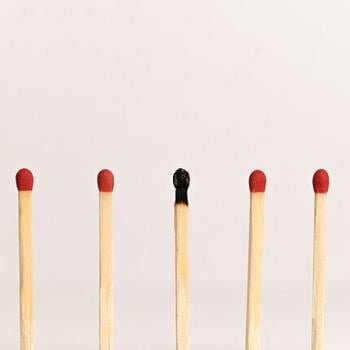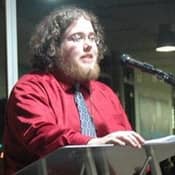I spent the better part of two days volunteering at the registration table at the Heartland Pagan Festival this past year. Almost nobody else had signed up for registration duty, so as it stood, two committee-members—I'll call them Leah and Janice—were booked to spend their entire festival in the little shack near the entrance to Camp Gaea. Since they preferred to have two people in the shack at all times, they still ended up spending most of the weekend in there, but at least I helped them escape for a few hours apiece.
No new visitors had come by for about an hour and a half, and there was nothing much to do except wonder when the rain would start again, so we started to talk shop: what we thought of the workshops on the schedule, how the sweat lodge would pan out this year. We got to the traditional pastime of complaining about those we deemed fluffier than us. Leah said something while we were on that subject that's stuck with me. "Most people think life's all sweetness and light. I'm different. I'm comfortable with darkness. I understand death." She laughed as she said it.
That's a statement I've heard before, though, I must admit, mostly from gangly folks who wore more black than Leah. But it's a common sentiment: most people, especially pagans, prefer to pretend death doesn't really exist, but some can move past that, accept death's presence, and have learned how to be comfortable with that.
I like Leah a lot, but I don't think I can trust her on this.
I don't believe anyone really falls into the second category—one way or another, we're all living as though death isn't going to happen to us. The concept of non-existence is just too alien; except, perhaps, for those nearing the end of a terminal illness, I doubt anybody really understands it. (I certainly include myself in this category—like Hamlet, I can only think of death in terms of eternal, uncertain sleep. But we understand sleep as something one wakes up from....) Maybe some people really are comfortable with death, but I can't imagine how. It seems like the kind of thing you'd say precisely because you don't really believe it.
One of the paradoxes of paganism, particularly Wicca, is that, although our religion's cosmology is quite capable of handling death on a theoretical level, we do not have much in the way of structure for death on a personal level. To pagans, death is largely something that happens to other kinds of people.
Let me explain what I mean. I certainly don't mean that pagans don't face death—that we don't grieve, that we don't feel the pain of loss. We all have people we love who have died. But by and large, the places where we express that grief are not pagan spaces. Most of the people we mourn are not pagans: their funerals will be held in churches and funeral parlors, their eulogies read by pastors and priests. At almost every funeral I've attended, there has been a moment where I have been asked to bow my head and pray for the departed in the name of a god I did not worship. The rituals of death, as they say, are meant more for the comfort of the living than the dead, and yet those rituals could not comfort me. As a religious minority, most funerals we attend will be in places that are, at best, unrelated to our spiritual lives, and possibly actively hostile to them; this must color our grief.
Earlier this year, I described the loss of a member of my pagan family in my column "Summer in the Jar." But I was struck by how foreign that experience was, and how little I knew how to deal with it: paganism did not have the structures in place that other religions did. When a Catholic dies, there is a Catholic process of dealing with the grief, of handling the funeral, of remembering the dead. But what do we do when a pagan dies?
My friend Sarah and I were the hosts of the next sabbat after Tom's passing, Midsummer. As a result, it fell to me to write a funeral ritual for him. It was, no doubt, the most difficult ritual I've ever had to write. Every other ceremony I've performed had a basis in my coven's traditions: I knew how to write a Mabon ritual because I had been a part of other Mabon rituals since I was a child. But I had never been to a pagan funeral. The closest I had come was a brief memorial for Stewart Farrar I once attended, but Stewart had been dead for a long time by the time that happened. Besides, while I respected Stewart, it wasn't as though I had known him. We had no real idea of what our ritual should look like.
So we did what pagans seem best at—we took the frame of something that worked, and we made something up that felt right. We cast the circle and called the quarters, and we sang a song that we knew he loved. Then we planted him an apple tree, closed the circle, and ran like hell to our cars before the thunderstorm came upon us.





